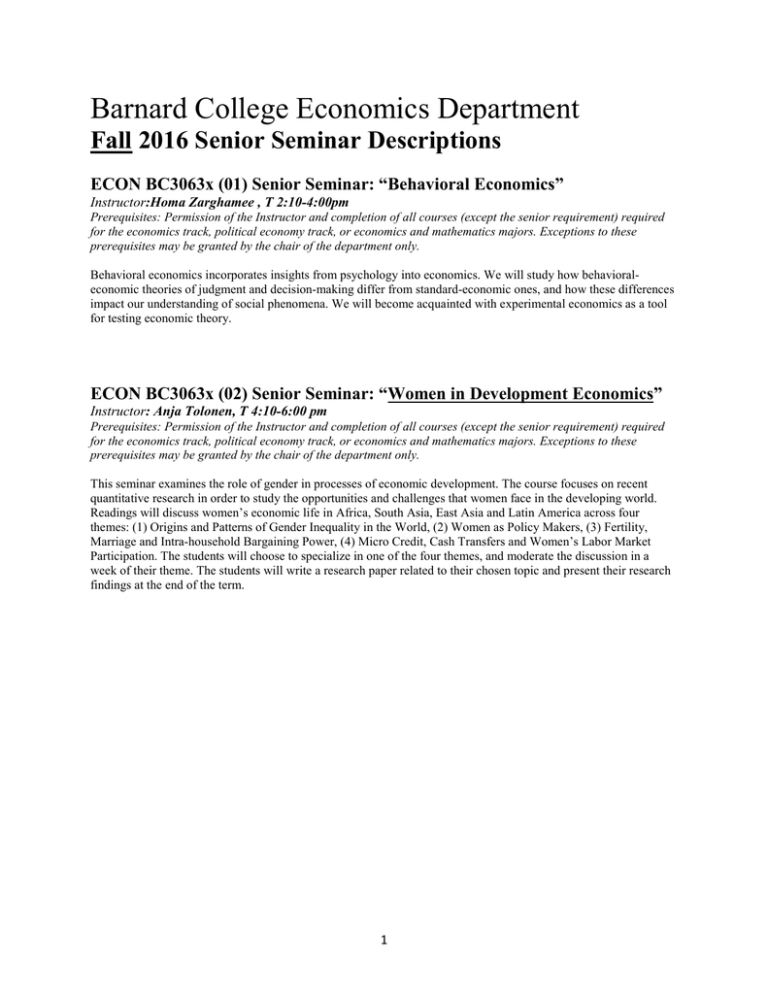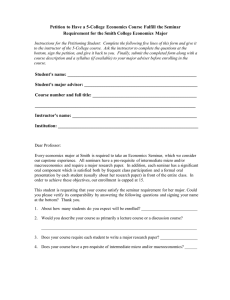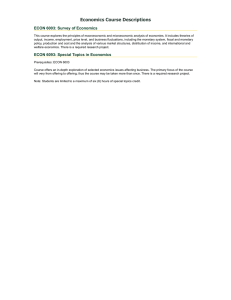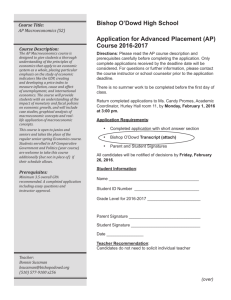Barnard College Economics Department Fall 2016 Senior Seminar Descriptions
advertisement

Barnard College Economics Department Fall 2016 Senior Seminar Descriptions ECON BC3063x (01) Senior Seminar: “Behavioral Economics” Instructor:Homa Zarghamee , T 2:10-4:00pm Prerequisites: Permission of the Instructor and completion of all courses (except the senior requirement) required for the economics track, political economy track, or economics and mathematics majors. Exceptions to these prerequisites may be granted by the chair of the department only. Behavioral economics incorporates insights from psychology into economics. We will study how behavioraleconomic theories of judgment and decision-making differ from standard-economic ones, and how these differences impact our understanding of social phenomena. We will become acquainted with experimental economics as a tool for testing economic theory. ECON BC3063x (02) Senior Seminar: “Women in Development Economics” Instructor: Anja Tolonen, T 4:10-6:00 pm Prerequisites: Permission of the Instructor and completion of all courses (except the senior requirement) required for the economics track, political economy track, or economics and mathematics majors. Exceptions to these prerequisites may be granted by the chair of the department only. This seminar examines the role of gender in processes of economic development. The course focuses on recent quantitative research in order to study the opportunities and challenges that women face in the developing world. Readings will discuss women’s economic life in Africa, South Asia, East Asia and Latin America across four themes: (1) Origins and Patterns of Gender Inequality in the World, (2) Women as Policy Makers, (3) Fertility, Marriage and Intra-household Bargaining Power, (4) Micro Credit, Cash Transfers and Women’s Labor Market Participation. The students will choose to specialize in one of the four themes, and moderate the discussion in a week of their theme. The students will write a research paper related to their chosen topic and present their research findings at the end of the term. 1 Spring 2017 Senior Seminar Descriptions ECON BC3063y (01) Senior Seminar: “Financial Instability and Economic Performance” Instructor: Rajiv Sethi , Hours TBA Prerequisites: Permission of the Instructor and completion of all courses (except the senior requirement) required for the economics track, political economy track, or economics and mathematics majors. Exceptions to these prerequisites may be granted by the chair of the department only. This seminar is examines the contemporary financial system and its interactions with the broader economy. We begin with a look at how mortgages and other debt contracts appear on the balance sheets of borrowers and lenders, how leverage amplifies the losses and gains from changes in asset values, and how loans are originated and packaged into securities for sale to investors worldwide. We then examine the role of banks and shadow banks in the economy, with a focus on maturity transformation, which is the financing of long-term assets with short-term liabilities. This opens up the possibility of bank runs when liabilities are not insured, and we look at runs on commercial banks in historical perspective, and runs on the shadow banks during the recent crisis. A key theme throughout the course will be role of information: the implications of asymmetric information between borrowers and lenders, the importance of information insensitivity of liabilities that serve as money, the use of information by credit rating agencies, the role of collateral in mitigating credit risk, and information racing by highfrequency trading firms in securities markets. The first two weeks will be spent on developing familiarity with key concepts, and the course will therefore be accessible to those without any background in finance. ECON BC3063y (02) Senior Seminar: “Human Capital & Human Freedom” Instructor: Lalith Munasinghe, Hours TBA Prerequisites: Permission of the Instructor and completion of all courses (except the senior requirement) required for the economics track, political economy track, or economics and mathematics majors. Exceptions to these prerequisites may be granted by the chair of the department only. In this senior seminar we read a collection of essays written by economists and philosophers that relate to three broad topics: Human capital theory (HCT), human freedom, and the role of the worker in the modern workplace. Human Capital Theory. Our readings will focus on the historical origins of HCT and on the puzzles and facts of labor market phenomena that the theory is designed to explain. We will read some of the pioneering works by two Nobel laureates in economics Schultz and Becker. Human Freedom. We will read about and discuss various notions of human freedom, starting with a highly romantic and individualistic vision of Marx, and then moving on to more contemporary ideas of negative and positive conceptions of human freedom. Our readings will begin with Marx (selections from the 1844 Manuscripts, Grundrisse and Capital Vol. III), and continue on to some modern essays by Isaiah Berlin, Charles Taylor and Amartya Sen. Worker and Firm. The final topic focuses on economic theories of the employment relationship between the worker and the firm. The readings will be aimed at providing multiple perspectives on the worker-firm relationship. In particular, we will read about the employment relationship from the radical, neoclassical and the managerial perspectives, with a view to unraveling the philosophical differences in these accounts. Readings will include papers by Marglin, Stiglitz, Bowles, and Lazear, to mention a few. Here are some broad questions that I hope these readings will prompt us to think about and discuss in class. 1. The first set of questions relates directly to freedom. For example, what constitutes human freedom or what is the locus of human freedom? Is freedom about whether human beings as moral agents live up to some predetermined ideal in the Platonic sense? Or is it more about the nature of human activity as it relates to the creative pursuit of diverse human interests? 2 (Spring 2017 continued) 2. A second set of questions is to ask whether human freedom might in any way relate to human capital theory. For example, do we have to learn skills or cultivate our tastes, interests and desires to become free agents just like we learn skills to become lawyers and carpenters? 3. A third set of questions relate to whether freedom can be achieved within the context of the modern workplace. For example, is work necessarily alienating? Is it a mere means to other ends? Or is it possible to find freedom and meaning in our working lives? ECON BC3063y (03) Senior Seminar: “Economics, Culture & Happiness” Instructor: Sonia Pereira, Hours TBA Prerequisites: Permission of the Instructor and completion of all courses (except the senior requirement) required for the economics track, political economy track, or economics and mathematics majors. Exceptions to these prerequisites may be granted by the chair of the department only. Benjamin Franklin once said, “Money has never made man happy yet, nor will it, there is nothing in its nature to produce happiness. The more of it one has the more one wants.” But ask anyone whether more money would make them happier and most likely their answer will be yes! Well, it turns out that recent research agrees with both views! In this course we look for answers to the following questions: What is the relationship between economic wellbeing and happiness both at the individual and at the societal levels? Can happiness be measured? If so, how? What variables explain variations in happiness across individuals and across countries? And how can one become happier? Which cultural frameworks promote economic growth and which ones promote happiness? Should economic policy focus on maximizing happiness? If so, what policies could achieve increased happiness? We start with a brief history of the economic and philosophical thought on the concepts of happiness and utility. We discuss the link between culture and philosophical views on happiness. We then study the recent empirical economic literature on happiness including measures and methods used and main findings. We also look at contributions from other fields of study: psychology, neuroscience and medical. Finally, we also ask which cultural dimensions contribute to economic growth and which ones contribute to happiness. Assignments include short written assignments, in-class presentations and a longer term paper. The assignments are designed to allow students to explore new answers to some of the questions studied, to ask new questions, and to reflect on their own personal views and assumptions about the pursuit and attainment of happiness. Students will be introduced to mindfulness and self-inquiry exercises from the happiness literature. In their term paper students will be encouraged to do hands-on data work, either by resorting to existing databases or through interviewing, though this is not a requirement and papers can also be theoretical. 3



